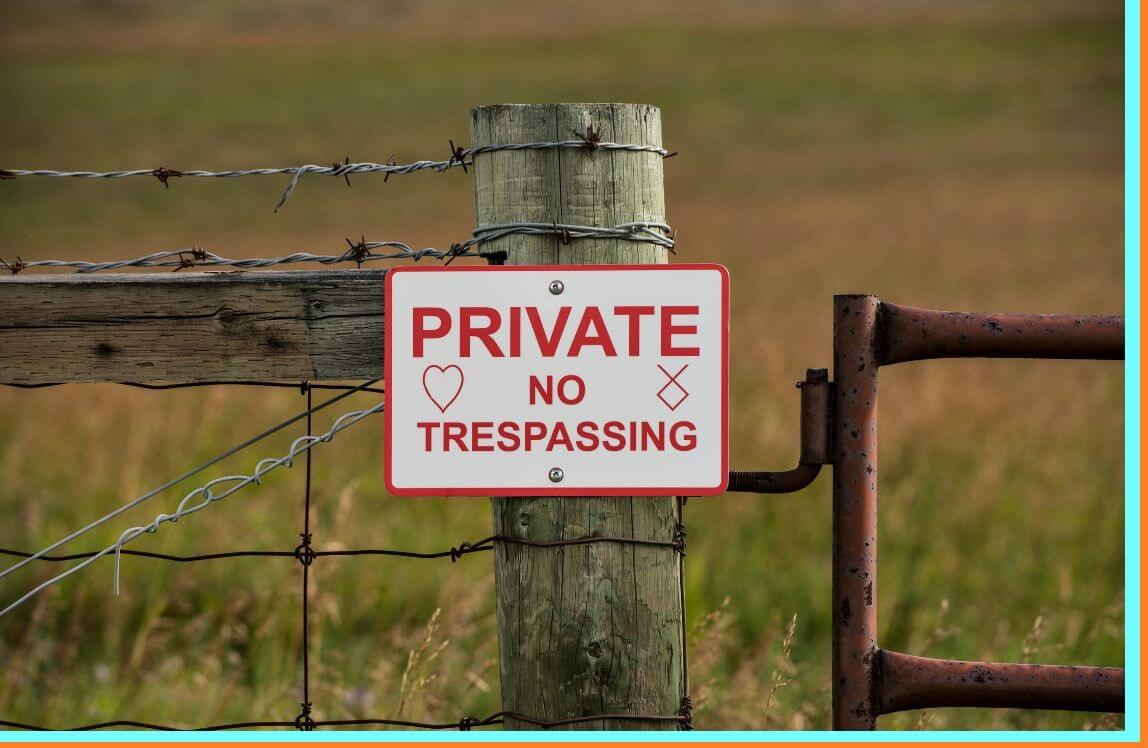When you enter or enter someone else’s property without their permission, it is called trespassing and comes under the category of crime.
So today we are going to tell you about the laws of the states related to encroachment. Because every state has its own laws as per its requirements. So let us know about encroachment.
definition of trespassing

Trespassing is a type of crime which involves entering someone else’s land or property without their permission and making a claim on that property or taking advantage of it. It is included as a crime. This is a criminal offense and violations can result in serious penalties.
To put it in simple words, trespassing occurs when someone intentionally enters the property of another person without his permission. This can include entering a building, crossing the boundary line and remaining on someone’s property after being asked to leave.
Trespassing Basics
trespassing is a legal term, and it also refers to other trespassing and other crimes included in it. Like what type of trespassing it is and for what purpose the trespassing has been done. These are some of its basics. Because trespassing is a broad word. Which can refer to a variety of crimes against a person or property. As related to real estate law, trespassing means entering onto land without the landowner’s consent.
1. Requirements for Intent and Knowledge
Depending on whether trespassing is a criminal or civil violation, there are different criteria for purpose and awareness. Criminal trespassing requires that the perpetrator purposefully enter or remain on another person’s property without authorization. State and municipal prosecutors and police are in charge of upholding the law. If found guilty, the offender might have to pay penalties or serve time in jail.
In order to be charged with civil trespassing, an individual must have intentionally entered another person’s property without authorization, damaged it, or interfered with the owner’s use of it.
Law enforcement is carried out by private citizens who file lawsuits against lawbreakers. Usually, if found guilty, the criminal must provide restitution to the victim.
In general, some degree of intent is necessary for both criminal and civil trespassing. A person trespassing must intentionally enter another person’s property without authorization, not just happen to walk across it by accident.
2. express agreement
You can enter a land owner’s land with his permission, but for this you must have written permission along with the start date and end date. In many states a landowner may give you permission to enter his land for a limited time or purpose.
However, it depends on the land owner how long they allow you to stay on their property. The permission letter can be canceled at any time by the land owner.
What are the Penalties for Criminal Trespassing?
Entering or remaining on someone else’s property without that person’s permission is known as criminal trespassing. Depending on the state in which the violation was committed and its severity, there are different consequences for criminal trespassing.
If found guilty of criminal trespassing, the punishment often consists of a fine, which can be as little as several hundred dollars or as much as $5,000 or more. Although it is uncommon, jail time may also be given in certain situations. The seriousness of the offense and the state in which it was committed determine the sentence and fine amounts.
For instance, first-degree trespassing carries a fine of up to $2,000 and a maximum sentence of 60 days in jail in North Carolina. The penalties for second-degree trespassing include a $200 maximum fine and up to 20 days in prison.
It’s crucial to remember that property owners are entitled to the exclusive use of their space and the ability to bar uninvited visitors. It is best to ask permission before entering someone’s property if you are not sure if you have permission to do so.
what is trespassing in florida
Trespassing in Florida is defined as intentionally entering or staying on someone else’s property without that owner’s express or implicit consent. Trespass in Structure or Conveyance and Trespass on Property Other Than Structure or Conveyance are the two types of criminal trespass recognized by Florida law.
A “conveyance” is defined in this statute as a sleeping car, an airplane, a trailer, a car, or a boat, vessel, or ship. Penalties for trespassing inside a building or vehicle can include jail time, probation, and a permanent criminal record.
Trespassing Law
There are many laws relating to trespass.
1. Trespass to Land: The act of entering someone else’s property without authorization or a valid reason is known as trespassing on land. It is a criminal or common law tort that can be committed carelessly or with intent. The right of the property owner to utilize their property as they see fit, including barring others from entering, is inherent. Depending on the location and state legislation, trespassing may be considered a criminal act, a civil tort, or both.
2. Trespass to Chattels: The legal term “trespass to chattels” refers to interfering without permission with another person’s private property. Trespassing on chattels, as opposed to real property, which refers to actual land and buildings, involves movable objects like cars, electronics, and other tangible personal property.
3. Trespass to Conversion: In contrast to trespass to chattels, trespass to conversion represents a significantly more profound and severe interference. In cases of trespass to conversion, the chattels are entirely dominated or even obliterated by the trespasser.
The level of harm inflicted on the property possessor’s interests is so substantial that it may necessitate the trespasser to compensate for the entire value of the chattel. It deals with instances in which someone not only tampers with another person’s property but also transforms it for their own benefit.
What is the difference between criminal trespassing and civil trespassing?
Criminal trespassing and civil trespassing are two different types of offenses. The key difference between them is who enforces the law.
Criminal trespassing: Intentionally entering or remaining on someone else’s property without authorization is known as criminal trespassing. State and local prosecutors and police are in charge of upholding the law. If found guilty, the offender might have to pay penalties or serve time in jail.
civil trespassing: Civil trespassing, on the other hand, is a tort that involves entering someone else’s property without permission and causing damage to the property or interfering with the owner’s use of the property. A private citizen enforces the law by bringing a lawsuit against the offender. If found guilty, the offender typically has to pay the other person money.
Conclusion
In conclusion, understanding trespassing laws is essential for both property owners and individuals to navigate property rights and legal boundaries. These laws aim to protect personal property while allowing for valid defenses in cases of necessity.



